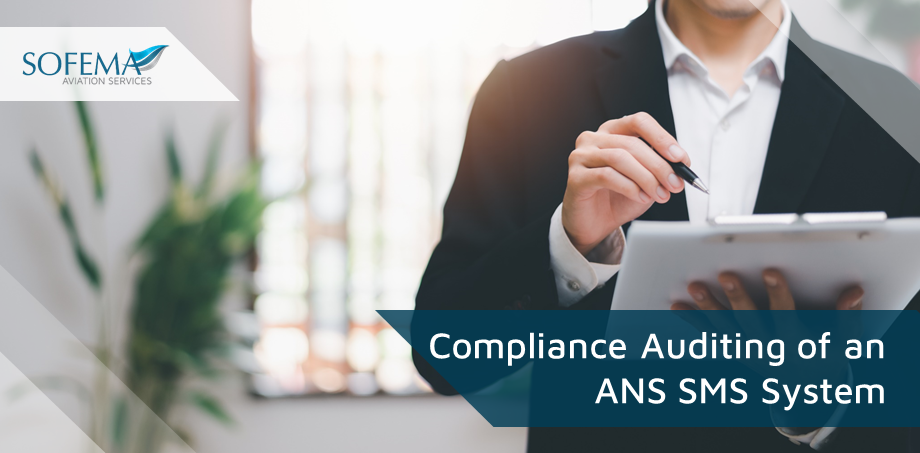Sofema Aviation Services (SAS) ww.sassofia.com considers the key aspects when auditing the Air Navigation and Safety Management System (ANS SMS System)
Introduction
It is important to realize that the role of both QMS and SMS is to provide a service to the management team to understand both the non-conformities and risks which they face within the business areas.
Safety Assurance should ensure that throughout the lifecycle of the change, management is presented with feedback regarding the effectiveness of the implemented processes as well as the overall health of the system.
Auditing an SMS within the EASA Air Navigation System is crucial.
- While there are similarities with QMS, the focus of SMS is on risk and performance.
- Auditors need to go beyond just checking for compliance and delve into the effectiveness of the system.
- This involves looking at how the organization manages change, how it measures the effectiveness of its SMS, and how engaged both employees and management are with the system.
Regulation (EU) 2017/373 outlines the responsibilities and procedures for competent authorities in the aviation sector when non-compliance with safety regulations is detected in service providers.
- It establishes a system for analyzing findings, deciding on enforcement measures, and ensuring corrective actions are taken.
Considering the different roles of Safety Management Systems (SMS) and Quality Management Systems (QMS)
- QMS and SMS – Offers many common methods and techniques, but provides different outcomes and objectives
- Sufficient competent resources are critical to the success of both the CM system and the SMS.
- In essence Quality Assurance is determining gaps based on non-compliance with either the regulatory requirements or organizational requirements.
- Safety Assurance is looking at weakness in the organizational system which raises the risk exposure.
o Safety Assurance is a forward-looking process essentially related to exposure performance and
o Quality Assurance is evidence looking at prescriptive compliance related to new or historic data
The SMS Audit Challenge
The Challenge is how to audit the SMS System – which of course is part of the compliance obligations of the QMS.
Why?
- Simply because SMS is a Performance Based System and it is not effective to validate such a system using compliance techniques alone.
- Sure the basic audit can look at compliance factors – however additional questions need to be asked which will demonstrate that the SMS is achieving its objectives.
- Consider the Following –
o A high level of Competence is required within the SMS related to the challenging area of Hazard Identification, Safety Risk Analysis, System Evaluation, and Mitigation Proposal.
So to consider the practicalities of a Quality Audit of the Safety Management System
- Regarding the basic functionality, lets call it the compliance elements the SMS audit is straight forward and we look at the usual areas of
o Management
o Training
o Documentation
o Communication
o Marketing
o Process & Procedures
- For the above elements we are in familiar water and can audit in the normal way
o What should happen?
o Is it happening as documented / stated?
o If yes good & If not then we have the basis of a finding!
Regarding the Performance Elements of SMS Audit
Essentially to audit a “performance system” use an auditing technique which relates to performance questions.
- How are you measuring the effectiveness of your SMS system?
- Is the “measurement” process working ? (How can this be demonstrated?)
- Is “Data” being collected from “All” relevant business areas?
- Is the Data sufficient ? (means are all exposures – or enough to demonstrate an effective process delivery being captured)
- Is the Safety Review driven by Change Management visible & viable
- Do the front-line employees identify with the SMS – how is this evidenced?
- Does Senior Management Identify with the SMS – how is this evidenced?
Auditing the Management of Change Process for Effectiveness.
Multiple changes WILL occur within the aviation system, both internal and external including regulatory changes, management changers, equipment changes, changes in procedures process or manning levels.
- A change management process should be a documented strategy to proactively identify and manage the safety risks that can accompany change, whilst it is focused on significant change, in fact any change may have a “knock on” or trickle down effect.
- An effective process will assess in fact all change. Changes may impact existing mitigations or introduce new risks and exposures and it is necessary to have a formal process to assess and measure the impact.
This process requires the full force of the SMS Hazard and Risk Assessment Process which requires that any perceived safety risks connected to the consequences of hazards to be analysed developed, implemented and subsequently evaluated and measured for effectiveness.
Next Steps
Follow this link to our Library to find & download related documents for Free.
Please see the following course EASA Quality Assurance Auditing Introduction for Air Navigation Services (ANS) – 3 Days
Visit our websites www.sassofia.com and www.sofemaonline.com or email team@sassofia.com
Tags:
Quality Assurance, Safety Assurance, Safety Management System, SMS Audit, Aviation Compliance Auditing, Management of Change, Quality Management Systems (QMS), ANS SMS System, QMS and SMS




